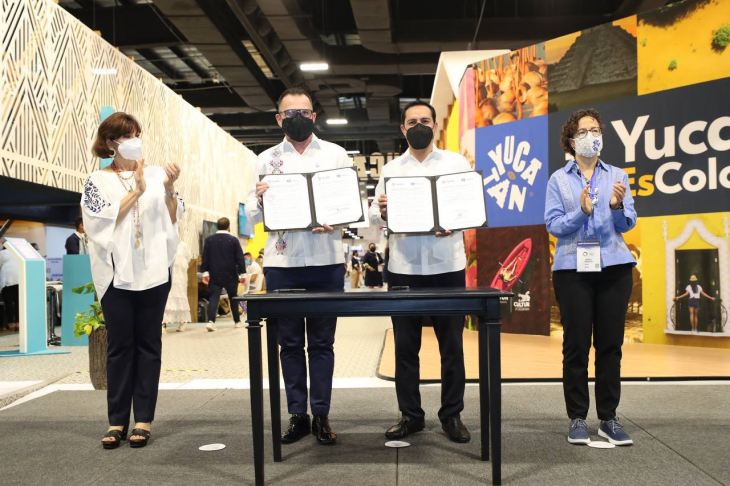Merida, Yucatan, (November 19, 2021).- The governor of Yucatán, Mauricio Vila Dosal, and the representative in Mexico of the United Nations Educational, Scientific and Cultural Organization (UNESCO), Frédéric Vacheron, signed a collaboration agreement for sustainable tourism that protects, promotes, and safeguard the cultural and natural heritage of the state, and continue to fight against all kinds of discrimination and exclusion.
In this context, Frédéric Vacheron indicated that this is a historic moment for cooperation between Unesco and Yucatán, and recalled that the world organization has recognized the entity, in aspects such as its archaeological sites and creative ecosystem, which recognized that it is very strong, so the support will focus on linking the Sustainable Development Goals, to fight against all types of discrimination and exclusion.
“We thank and congratulate Yucatán for all the progress it has had in recent years, such as having incorporated the new Law on Cultural Rights; also, the Sustainable Development Goals in its State Plan 2018-2024 and to specify it, with precise actions and for the benefit of the entire Yucatecan population, such as this great collaboration, ” he said.
Regarding the works included in this agreement, Frédéric Vacheron indicated that tourism can help preserve heritage, promote creativity and solve problems of social exclusion, and in Yucatán, an inclusive one is being proposed, so collaboration with different dependencies of the state government, to diversify it through all the cultural heritage that the territory has.
The Secretariats of Tourism Development (Sefotur), Sustainable Development (SDS), Culture and the Arts (Sedeculta), and Planning and Evaluation Technique (Seplan) will actively participate with Unesco; They will formulate management, safeguard, and strengthen plans to identify tourism promotion strategies that contribute to the valuation and preservation of cultural, tangible, intangible and underwater heritage, as well as natural, biosphere reserves and Protected Natural Areas.
Accompanied by his counterpart from the Sedeculta, Loreto Villanueva Trujillo, Fridman Hirsch pointed out that having the Unesco guide, on how to develop tourism while taking care of the environment and our traditions, will allow us to carry out inventories of all the heritage we have, learning to improve the urban image of our destinations and the opportunity to aspire to denominations or designations that help us in the promotion of Yucatan.
In the presence of the secretary of the SDS, Sayda Rodríguez Gómez, it was indicated that the agreement also contemplates the implementation of methodologies and tools, such as the Recommendation of the Historic Urban Landscape, for the development plans of cities and historical sites, such as Mérida and Izamal; in addition, identification and preparation of inventories of intangible cultural and gastronomic heritage.
The previous ones will be based on the ethical principles of the Organization and will include practices such as, for example, the traditional Vaquería and the Jarana, and it is proposed to recognize and give value to traditional knowledge, in particular those related to the Maya language, vernacular architecture, medicine traditional and ethnobotanical trails.
Similarly, Unesco will provide technical support for the application of basic principles, concepts, and processes of cultural conventions; identification of cultural assets; creation of geo-parks and geo-sites of high tourist value, in accordance with the guidelines of its World Program on the matter, and adoption of the 2030 Thematic Indicators of Culture.
TYT Newsroom


